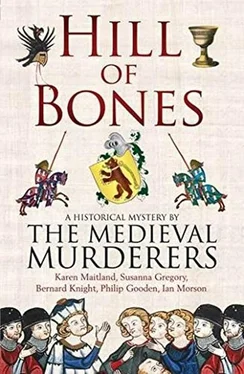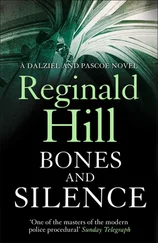‘You were the duke, sir? In the recent play?’ Her voice was low, well bred. Doubtless a lady.
‘You are responsible for this, madam?’ I said, flourishing the blank ‘privy message’ and not hiding my anger.
‘I must apologise, sir. I was in a great hurry and although a thousand phrases were whirling through my head, I could think of nothing to write that would guarantee your attention. But I believed you would be intrigued enough by what I wrote on the cover not to want to break the seal in front of your friends in the company. I thought you’d want to open it in private, by yourself. I have been watching you since you left the inn yard.’
All this was said in a rush with hardly a pause for breath. It was irritating that she had been able to predict my response to the letter so exactly. Hardly reassured, I said: ‘So you watched our play sitting in the yard of the Bear Inn? I didn’t notice you.’
‘I wasn’t in the yard but in a house, standing at a window high above the stage. I could see and hear quite well from up there.’
I remembered the face glimpsed while I was lying down dead, the white countenance peering from the gable window. For some reason, I shivered at the memory, and to cover the moment I laughed and said, ‘Well, madam, not only do you draw me away from my company and my bed-rest with a silly note – a blank sheet of paper – but now you inform me that you didn’t even pay good money to watch our play. I hope you enjoyed it.’
‘I did. I was much struck by your duke.’
‘That was a part that I played. I am not Duke Peccato,’ I said wearily.
‘I was frightened by the scene in the madhouse,’ she said.
‘We meant to frighten,’ I said, wondering where these compliments were leading. Still, it was good to know that the devilish masks and the white smocks worn by the players acting as lunatics were effective.
To put an end to our conversation, I said: ‘Sorry to disappoint you but I’m not a duke or lunatic after all, merely a member of the King’s Men, and one who is tired after an evening’s work and now intends to return-’
I stopped as she stretched out a hand and clasped my arm tight.
‘Help me.’
That was the point where I should have shaken off her hand, turned on my heel and gone back to Mother Treadwell’s to face the jokes and the prying questions of my fellows. But I didn’t. Foolishly, I stayed and said: ‘At least give me the courtesy of your name since you did not include it in this – this privy message.’
‘Katherine Hawkins. I live there, in a house overlooking the yard of the Bear.’
Still holding my arm, as if afraid I might break away, she gestured behind her with her other hand.
‘Well, I’m Nick Revill. I live in London.’
‘You can do me a great service, sir.’
‘How?’
‘By visiting a dying man.’
‘You need a priest, not a player,’ I said. Gently I prised her fingers from my arm.
‘The priest will come soon enough. I need you now.’
It’s hard to resist when a young woman appeals to you directly. At least, I found it so. It had occurred to me that this might be a trap but she was speaking very earnestly and I believed her honest – or wanted to believe it.
‘Who is dying? What can I do? I’m a player, I say again, not a priest or a doctor of physic.’
We were disturbed by the scrape of a window opening overhead, from where the gleam of light shone. A head thrust out. A male voice said: ‘Do your business elsewhere. Be off or I’ll call the watch.’
We both looked up. She quickly averted her head from the man above, perhaps fearful of being recognised, but I had a glimpse of her face, pale, drawn, beautiful. The window was shut, firmly. We were speaking quietly after my initial burst of anger but we’d been there for a few minutes. Anybody looking down on a man and woman in a public street late at night, talking low, negotiating, would have come to the obvious conclusion.
‘Please. Come with me, Mr Revill – Nicholas,’ said Katherine Hawkins. ‘I promise you… promise you on… on my mother’s grave… that there is nothing to be wary of. I will explain as we go.’
We walked round the corner and along Cheap Street, keeping clear of the kennel that ran down the middle of the street and which, in this dry midsummer, smelled of the muck and waste deposited there.
In the same soft tones, the woman said that she lived with her uncle, Christopher Hawkins, a respectable and well-to-do cloth merchant and a member of the town corporation. It was he who was dying. He had no more than a day or two of life left in him. The crisis might come at any moment, according to Dr Price. Although Christopher Hawkins was rambling in his wits he had clear moments. He was half deaf and almost blind too. His wife was dead and he had a single surviving son called William, a young man whom he had not seen for several years. William Hawkins was of about my age and build.
‘Where is your cousin, this William?’
‘I do not know. He is restless. The last I heard he was in London. He was searching for his course in life. He once said he wanted to be a player, like you,’ she said, folding her arm under mine and pressing close. ‘Then he said in a letter to me that he might try his fortunes in the New World, in the Americas.’
‘If he did, then he is thousands of miles away. He may as well be dead.’
‘I know. But my uncle has been calling out for his son, mumbling his name, asking for him. He has taken it into his head that William is quite close, that he may arrive at any minute.’
‘Perhaps he will.’
‘No, no, he will not. Or if he did it would be a miracle. I cannot depend on miracles. I do not need a miracle now that you are here, Mr Revill. Nicholas.’
She made to turn up a lane between houses but I stopped, forcing her to a standstill. The only light was that shed by the moon and, from down the lane, a couple of lanterns outside the houses.
‘I see what you’re proposing, madam. You want me to go and see your dying uncle and impersonate his son and clasp his hand and speak some words of greeting and comfort to him.’
‘Yes.’
‘I will not do it.’
‘But you are a player.’
‘This isn’t a play. It’s real.’
‘So much the more important, sir. My uncle is all in all to me. He and his wife took me in when my parents died in the plague in the old Queen’s time. I have no one else in the world except my absent cousin. I would be glad for Uncle to die happy.’
The mention of her parents’ death in the plague may have caused me to lean more attentively towards her. At any rate she sensed a slight softening in my attitude, for she went on: ‘You see, there was an estrangement between William and Uncle Christopher, a quarrel over nothing, but the last of many quarrels for he quit this house soon afterwards and went off to make his way in the world. I know that my uncle blames himself for what occurred. He would die happy knowing that you – he, I mean – had come back again. You have the manner of Cousin William, the height, something of the look, the voice even.’
‘As to the voice, I come from this part of the world,’ I said.
‘I knew it! I could almost believe this was fated.’
‘It is an imposture, madam, a lie.’
‘A white one. No guilt or blame attaches or, if it does, it is mine alone. It will only take an instant.’
‘What if he recognises me?’ I said. ‘I mean, what if he recognises that I am not his son, William. That would be worse than doing nothing.’
‘Uncle Christopher can hardly see, he can hardly hear,’ she said. ‘It is enough if he knows you are in the same room. I promise that if my uncle is not in a fit state to receive you, if he is wandering too much in his mind, I will not ask you again. It is now or never.’
Читать дальше












